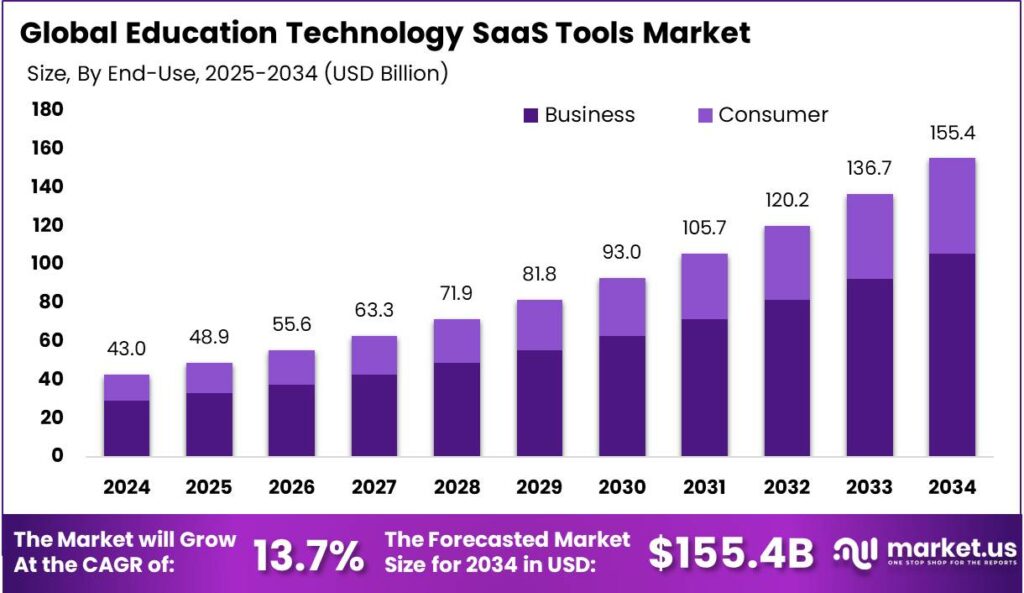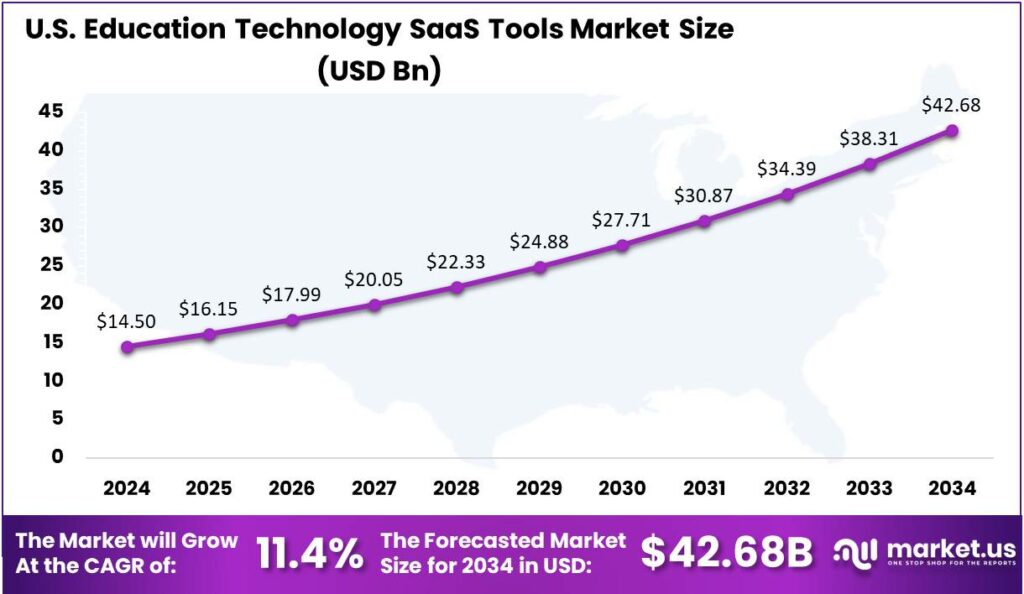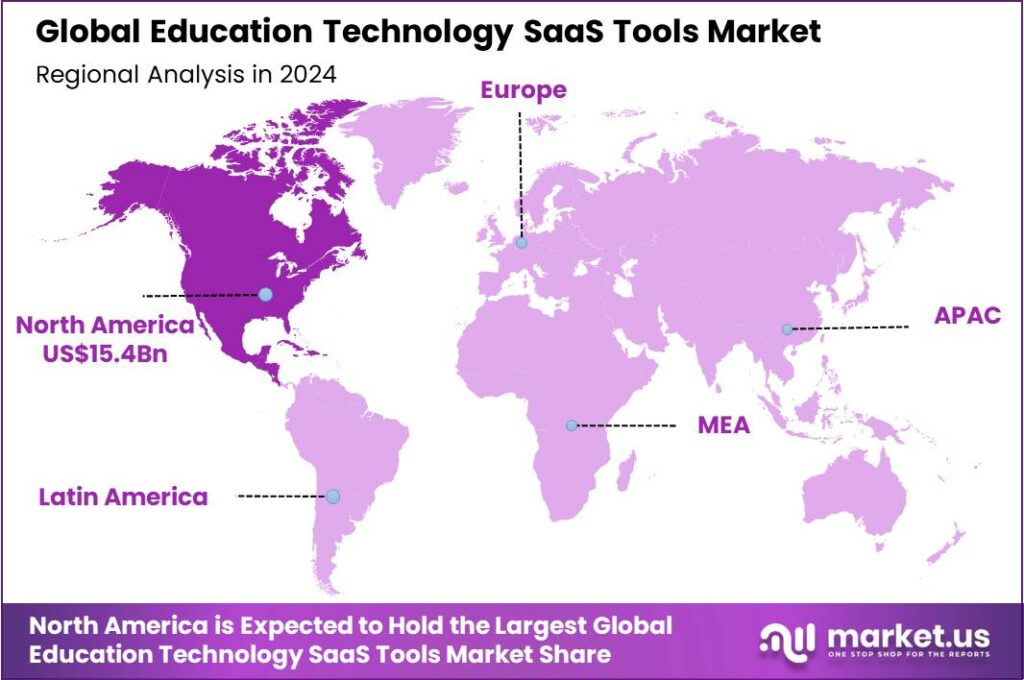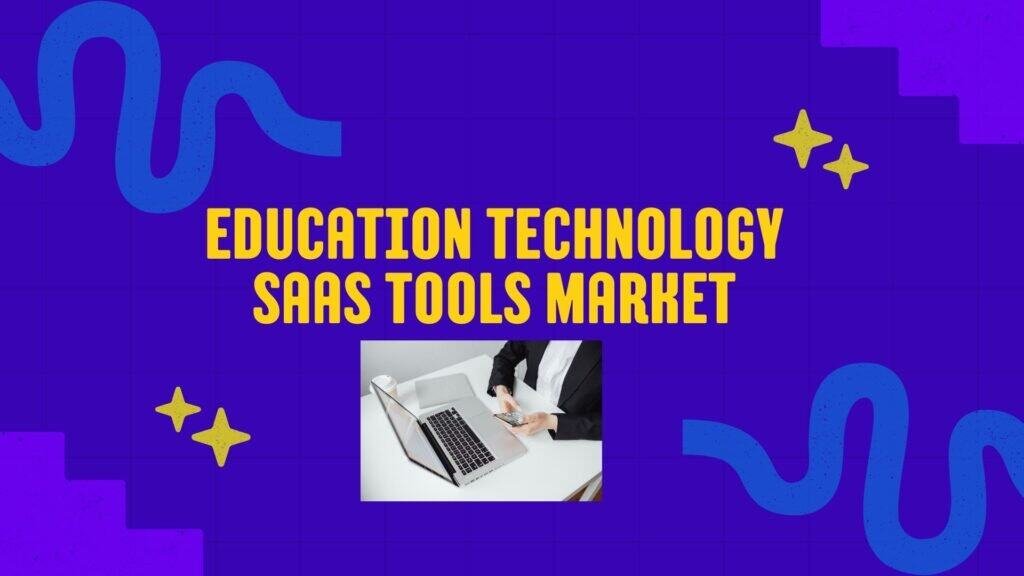Introduction
The Global Education Technology SaaS Tools Market is projected to reach USD 155.4 billion by 2034, increasing from USD 43.04 billion in 2024, at a CAGR of 13.70% from 2025 to 2034. In 2024, North America dominated the market with over 36% share, generating USD 15.4 billion in revenue. The U.S. market showed strong momentum, valued at USD 14.5 billion, and is anticipated to continue expanding steadily at a CAGR of 11.4%, driven by the growing adoption of cloud-based learning solutions and digital classroom tools.
The Edtech SaaS tools market is rapidly expanding, driven primarily by the growing shift towards digital and hybrid learning models in schools, universities, and corporate training. Adoption of cloud-based platforms is enabling scalable, flexible, and remote education that supports personalized learning, content delivery, and administrative tasks. Increasing internet penetration in emerging markets is also accelerating uptake, with North America currently accounting for over 30% of market adoption due to advanced infrastructure and institutional funding.
Top driving factors include strong government investments in digital education, rising demand for adaptive and personalized learning experiences, and integration of advanced technologies like AI and data analytics. The pandemic jumpstarted remote learning trends that continue to fuel demand for online course platforms and gamified learning tools. For example, nearly 54% of Learning Management System (LMS) revenues now come from modular SaaS offerings featuring AI-powered personalization.

Demand analysis shows that hybrid learning environments, which blend in-person and virtual education, are highly favored by institutions looking for flexible solutions. Corporate training also drives significant adoption, with companies wanting scalable e-learning tools to upskill and reskill employees efficiently. Additionally, the rising focus on lifelong learning supports growth in adult education platforms. Accessibility improvements via SaaS platforms enable learners worldwide to access courses anytime, on any device.
Quick Market Facts
- The Global Education Technology SaaS Tools Market is projected to reach USD 155.4 billion by 2034, growing from USD 43.04 billion in 2024, at a strong CAGR of 13.7% from 2025 to 2034.
- In 2024, the Learning Management System (LMS) segment dominated with 54.5% share, driven by increased adoption of digital learning and course delivery platforms.
- The K-12 segment held a leading position with 47.5%, reflecting strong integration of SaaS-based learning tools in school curriculums.
- The Business segment accounted for more than 68%, underscoring corporate investment in workforce training and continuous learning platforms.
- North America led the market with 36% share, generating USD 15.4 billion in revenue, supported by mature EdTech infrastructure and institutional adoption.
- The US market was valued at USD 14.5 billion in 2024 and is expected to maintain steady growth with a projected CAGR of 11.4%, reinforcing its leadership in cloud-based educational technology solutions.
Analysts’ Viewpoint
Increasing adoption of technologies such as AI, machine learning, gamification, cloud computing, AR/VR, and blockchain is prominent. These technologies enable personalized content delivery, real-time feedback, immersive and engaging learning experiences, secure credentialing, and efficient resource management. AI-driven personalization alone improves engagement by adapting to individual learner needs, boosting knowledge retention and outcomes. Gamified elements like leaderboards and rewards enhance learner motivation and participation.
Key reasons for adopting Edtech SaaS tools revolve around cost efficiency, scalability, and ease of use. SaaS models eliminate high upfront costs for hardware and software, replacing them with subscription plans that optimize budgets by paying only for needed features. Platforms scale easily as user numbers grow, supporting expanding learner bases and evolving programs without performance loss. Automation of administrative tasks through SaaS also frees educators’ time to focus on personalized support and content development.
Investment opportunities abound in developing hybrid learning technologies, AI-powered personalized learning, gamification, immersive AR/VR experiences, and blockchain for secure academic records. These areas address current demand for flexible, secure, and engaging education solutions. Investors are attracted by the market’s strong growth trajectory supported by post-pandemic learning shifts, technological innovation, and expanding global internet access.
Business benefits of Edtech SaaS tools include substantial cost savings, improved learning engagement, higher retention rates, flexibility in course delivery, and enhanced administrative efficiency. Companies have reported up to 52% reduction in training expenses after adopting e-learning SaaS. Additionally, about 76% of employees prefer employers offering upskilling opportunities enabled by these platforms, promoting workforce stability. Automation minimizes human errors in grading and tracking, while real-time analytics allow data-driven improvements in teaching strategies.
U.S. Market Dominance
The U.S. market for Education Technology SaaS Tools demonstrated significant growth in 2024, with a valuation of USD 14.5 billion. This robust market performance is projected to continue, with an expected compound annual growth rate (CAGR) of 11.4%. This positive trend highlights the growing use of SaaS tools in education, fueled by the demand for innovative, flexible learning solutions.

In 2024, North America held a dominant market position in the Education Technology SaaS Tools market, capturing more than a 36% share with revenues amounting to USD 15.4 billion. This region’s leadership in the market can be attributed to several key factors.

Driver
Growing Demand for Personalized Learning
One key driver of the Edtech SaaS tools market is the rising demand for personalized learning experiences. Educational institutions and corporate training programs increasingly seek solutions that tailor content to individual learner needs, preferences, and pace. Edtech SaaS platforms use data analytics and AI-driven algorithms to customize lessons, assessments, and feedback, which improves learner engagement and educational outcomes. This demand is fueled by the recognition that one-size-fits-all teaching is less effective in diverse learner populations and modern workforce training.
The personalization capability of Edtech SaaS empowers educators to monitor progress in real time and adjust instruction accordingly. This flexibility attracts schools, universities, and enterprises aiming to enhance learner success while managing resources efficiently. As a result, personalized learning remains a major growth factor for adoption and innovation in Edtech SaaS tools.
Restraint
High Initial Setup Costs
A significant restraint slowing Edtech SaaS deployment is the high initial cost of setup and integration. Schools and educational organizations often face financial barriers when adopting comprehensive SaaS solutions, which extend beyond subscription fees to infrastructure upgrades, training for educators, and ongoing support. These costs are particularly challenging for underfunded institutions and those in developing regions with limited budgets.
Moreover, the need to continuously update software and maintain technology compatibility adds to operational expenses. These financial challenges can delay or limit SaaS adoption, especially where public funding or private investment is insufficient to bridge the gap. Consequently, high upfront costs remain a notable obstacle to wider implementation of Edtech SaaS platforms.
Opportunity
Expansion in Emerging Markets
Emerging markets represent a promising opportunity for Edtech SaaS growth due to increasing internet penetration and mobile device accessibility. Countries in regions like Asia-Pacific, including China and India, have large, youthful populations with a strong demand for improved quality education. Governments are also investing heavily in digital education infrastructure, creating a favorable environment for SaaS adoption.
This opportunity allows Edtech companies to tailor their offerings to diverse educational needs in these markets, offering scalable, cost-effective solutions that can bridge gaps in access and quality. By leveraging emerging economies’ digital transformations, SaaS providers can significantly expand their reach and impact in these high-growth regions.
Challenge
Integration with Legacy Systems and Skill Shortages
One of the main challenges Edtech SaaS faces is integrating new platforms with existing legacy systems that many institutions still use. Older infrastructure often requires custom interfacing, adding complexity and costs to deployment. This integration issue can cause delays and reduce the expected benefits of adopting modern SaaS tools.
Additionally, there is a shortage of in-house technical skills within educational organizations to effectively manage and utilize sophisticated SaaS products. Lack of expertise in data analytics, cybersecurity, and instructional design limits the ability to innovate and fully leverage these platforms. Together, system integration difficulties and skill gaps constrain smooth implementation and long-term growth of Edtech SaaS services.
Key Market Segments
By Software
- Classroom Management System
- Document Management System
- Learning and Gamification
- Learning Management System
- Student Collaboration System
- Student Information and Administration System
- Student Response System
- Talent Management System
- Test Preparation
By Sector
- Preschool
- K-12
- Higher Education
- Others
By End-Use
- Business
- Consumer
Top Key Players in the Market
- Anthology Inc.
- PowerSchool
- McGraw Hil
- Microsoft
- Brightwheel
- Coursera Inc.
- eduzilla
- Kahoot
- Instructure, Inc.
- Google LLC
- Udemy, Inc.
- upGrad Education Private Limited
- Sorting Hat Technologies Pvt Ltd
- Scaler Academy
- Sunrise Mentors Pvt. Ltd
- Physics Wallah Pvt. Ltd
- Other Key Players
Source of information – https://market.us/report/education-technology-saas-tools-market/












